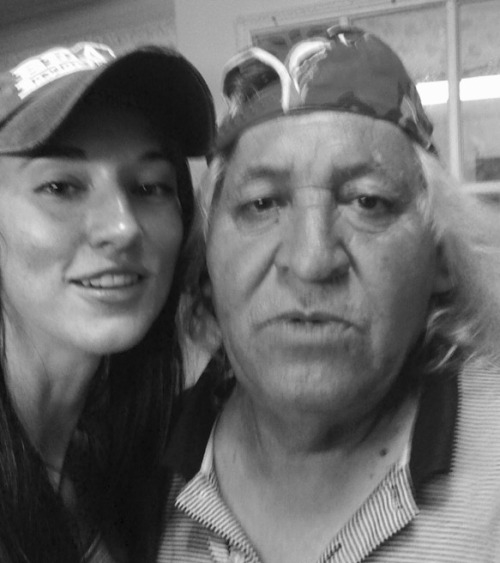Once Veteran Elizabeth A. Davis Breaks Out the Fiddle One More Time for Indian Joe
How a passion project convinced the Tony nominee to revisit the world of musical theater.
"I call myself an actor who plays, or an actor who sings — and in this scenario, an actor who writes," says Elizabeth A. Davis, whose world-premiere musical Indian Joe begins performances tomorrow at Goodspeed's Norma Terris Theatre.
The "Joe" referenced in the title of Davis' new work is Joe Lightfoot Gonzales — a homeless Native-American man with whom Davis developed a close friendship while studying at Baylor University. The formative and tumultuous relationship eventually inspired a series of essays, which then became a one-woman musical piece that has now grown to a full production up in Chester, Connecticut.
Since earning a Tony nomination in 2012 for her performance as Réza in the Tony-winning musical Once, Davis has become known as the actress with the fiddle — the instrument that also helped earn her a 2015 Drama Desk nomination for her performance in Rodgers and Hammerstein's Allegro at Classic Stage Company. Her voice and her violin have served her well over the years, but the classically trained dramatic actor would much rather take on a modest Measure for Measure than Broadway's next musical phenomenon. Even so, Indian Joe — which has added the titles of librettist, lyricist, and composer to her résumé — wore down her resistance and pulled her back into the musical fray.

When did you meet Joe?
I met Joe when I was a freshman in college. It was as if I was trying to clean him up and save him and he was convinced he was going to marry me and steal my car. [laughs] I got completely swept off my feet in the most platonic way possible with somebody that had seen life in a completely different way and I suddenly wanted to know everything about that. Joe had this incredibly hard exterior and was very mean to most people and somehow we found a way into friendship.
Do you remember how the two of you bonded?
I came to this breakfast through an organization called Mission Waco. I decided I was going to take my violin and play for the poor people. Because, you know, that's a good thing to do — go play for the homeless people. And Joe was there. He hated the music. He didn't want anything to do with me. Then I did this thing called poverty simulation, where you lived for a weekend with no resources — how a homeless person would exist living on the street — and I ended up sleeping under the I-35 Bridge. Joe…got up in my face and really tried to scare me. I remember my reaction was, "You don't scare me. I'm not just one of these passers-by that you think you're gonna freak out." There was something about the challenge of that, the excitement of that, as well as the empathy of that, that began our journey.
How did you come to the decision to turn your relationship with Joe into a piece for the stage?
I started writing essays. I love to write — that's how I process. And I began trying to understand this (at that point) ten-year friendship with a very confusing sixty-year-old Native-American homeless man, who in essence had become part of our family. Through the process of writing those essays, I ended up taking a solo performance class with Gretchen Cryer and so it began taking…an unexpected shape. I was able to take time off of Once to do [a] solo production at Cherry Lane. It was just myself on the violin, which is funny, because I am a classical actor. I do not consider myself a violinist or a vocalist.
And yet you always seem to find yourself in musicals playing the violin.
Exactly. Which is why I kind of hate that I'm perpetuating that stereotype in this production. But I'm a classical actor who got my bachelors and my masters in straight theater and came to the City with the intention to do Shakespeare, Chekhov, Shaw, Ibsen. That's still my first passion. I had people after that Cherry Lane production say, "The music seems to want to be more," and I was like, "No no no! I'm a classical actor. I want nothing to do with a musical. I happened to do this musical called Once but that's not who I am." So I was very reticent. I did not want to have any part in creating a musical.
What have been your greatest reservations over the course of the writing process?
There is a great deal of presumption that I'm having to wrestle with in regards to writing a musical. So I'm making sure I surround myself with people who are much smarter than me in lots of areas. But I think the urgency and the need to communicate a message trumps all of that and I can't be scared. I can't be nervous about sharing. I'm confronting myself and my old mistakes, I'm confronting people posthumously, so when I feel nauseous about it I just have to say, "I'm on the right track." Because what people respond to is authenticity and being real and being vulnerable, and that's what I'm trying to do with this show.
Was Joe aware that you were making his story into a musical?
He was. He died on August 15 of 2014…[but] I used to read him scenes. He wanted to play himself, that was for sure. He was going to play Joe in his own play. We had made plans for him to come to New York to see the Cherry Lane production [but] he was too sick. He had cancer at the time and we weren't able to fly him out. When that happened I became obsessed. It became an absolute mission to let people know his story. There is an endowment fund that I set up two weeks after his death called the Joe Lightfoot Gonzales Memorial Fund, and we are looking to raise fifty thousand dollars to make sure that the endowment goes on. It is set up to help first-generation students. You don't want homelessness to be the thing that identifies you. Kevin Ryan, the global president of Covenant House who works with homeless teens, says that homelessness is the least interesting thing about [his] kids. Homelessness is the least interesting thing about Joe.

(photo via officialelizabethdavis.tumblr.com)
To donate to the Joe Lightfoot Gonzales Memorial Fund, click here.










